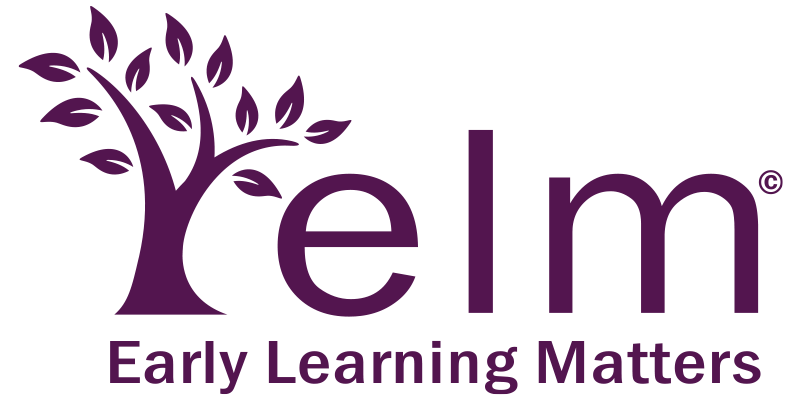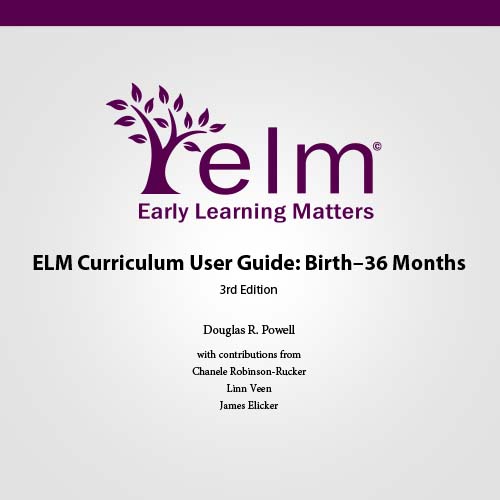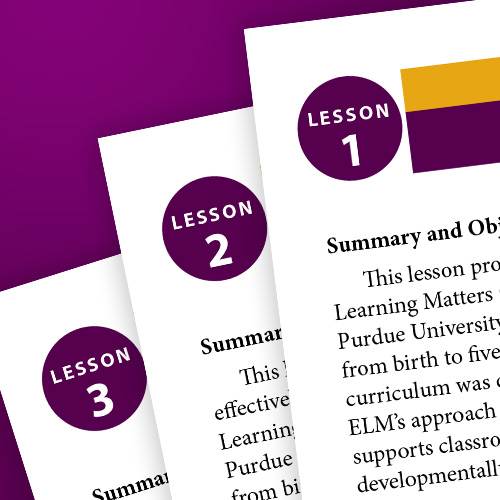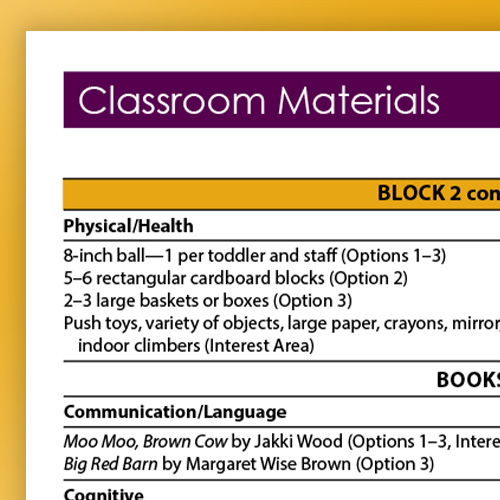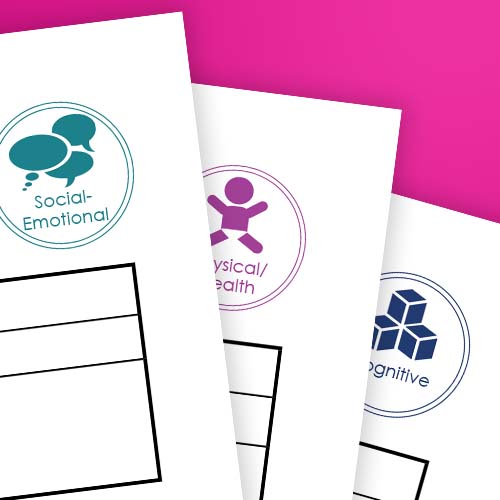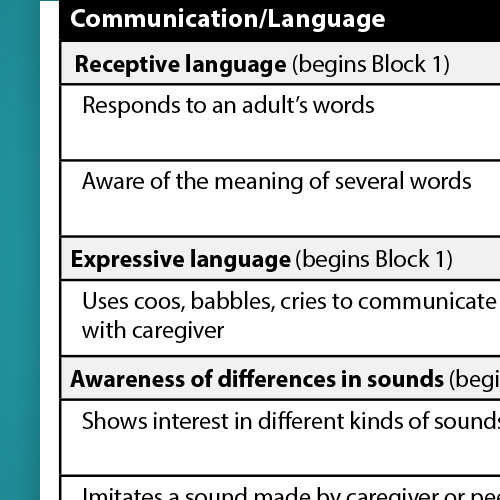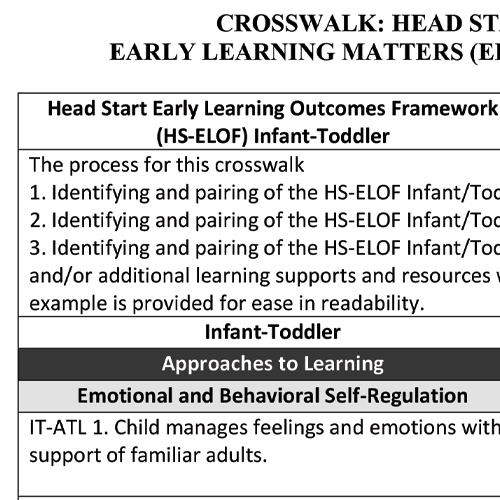
Overview
A child’s learning and development changes rapidly during the first three years of life. The ELM Curriculum promotes responsive interactions and flexible experiences that encourage individual children to pursue their own interests and to stretch toward what they do not yet know or cannot yet do.
ELM’s activities for infants and toddlers are organized into three age groups: Birth-12 months, 12-24 months, and 24-36 months. The activities are sequenced according to the way infants and toddlers typically develop particular skills and knowledge. The User Guide includes charts that show the sequence and focus of activity plans.
Each activity supports specific areas of development with play-based experiences that follow the child’s lead and recognize all areas of development are interrelated. Most activity plans are one-to-one experiences that help a caregiver tune into a child’s interests and development.
The activities are organized by blocks that cover a two-week period. There are 25 blocks of activities in each of the curriculum’s three infant-toddler age groups. Five different areas of development are promoted in each block.
Each activity plan offers 2-3 different options that are sequenced by level of challenge. Together, the options provide caregivers with flexibility in responding to children’s interests and needs.
The curriculum provides guidance on how to flexibly approach the selection and sequence of activities offered to each child. As caregivers well know, there are important developmental differences across children.
In addition to activity plans, the curriculum’s User Guide offers suggestions on how to promote particular aspects of learning and development during daily care routines, such as diapering and mealtimes.
There is one Readiness Starts Early parenting tips handout for every two-week block of activity plans. The tips are coordinated with classroom activities. A link to this resource is located in the left column of each block of activity plans.
Foundation Skills for Infants and Toddlers
- Receptive language
- Expressive language
- Awareness of print and pictures
- Awareness of differences in sounds
- Object Inquiry
- Problem-solving
- Self-control
- Concentration
- Executive function
- Social Interaction skills
- Awareness of emotions
- Gross motor development
- Fine motor development
- Good health practices
Preparing to Implement ELM with Infants and Toddlers: Five Steps
All resources developed by Purdue University for the ELM Curriculum are available free of charge on this website. They are organized by age group: Birth-36 Months and 3-5 Years.
In addition to ELM Activity Materials available as downloadable PDF images, most activity plans involve specific books and other items that are not provided by the ELM Curriculum. The Materials Lists provide information on these items.
Understand skills promoted by ELM and how the curriculum works.
Essential Resource:
Additional Resources:
- Online Training lessons on Using ELM Successfully and Introducing ELM to Direct Care Staff.
Plan or adjust your classroom’s daily schedule to incorporate ELM activities in ways recommended in the User Guide.
Essential Resource:
Additional Resource:
- Online Training lesson on Using ELM Effectively.
Become familiar with components and effective use of activity plans.
Essential Resources:
- ELM Curriculum User Guide: Birth-36 Months
(pp. 53-67) - Activity plans appropriate to your age group
- ELM Infant-Toddler Activity Observation Checklist
Additional Resources:
- Online Training lessons on Making the Most of Activity Plans and Using the Activity Observation Checklist.
Understand approaches to tailoring children’s learning experiences.
Additional Resources:
- Online Training lessons on Observing, Assessing, and Individualizing, and Helping Staff Tailor Learning Experiences.
Consider ways ELM Curriculum resources can help strengthen partnerships with families.
Essential Resources:
- ELM Curriculum User Guide: Birth-36 Months
(pp. 71-72) - Readiness Starts Early tips for families
- Examples of child progress portfolio entries in Guides for Observing and Individualizing
- ELM Snapshot of Child Progress form for Birth – 12 Months and for 12 – 36 Months
Activity Plans
infants and toddlers:
Sequence of Skills and Learning Goals charts with links to 25 corresponding blocks
Lists of 25 Block Numbers
Please note: Using a desktop or laptop computer offers the best experience for navigating the ELM Curriculum pages.
Activity Plans
There are 25 blocks of activity plans in each of the following age groups:
Please note: Using a desktop or laptop computer offers the best experience for navigating the ELM Curriculum pages.
Tools to Support ELM Activities with Children Birth - 36 Months
Ready to Get Started?
All resources developed by Purdue University for the ELM Curriculum are available free of charge on this website. They are organized by age group: Birth-36 Months and 3-5 Years.
In addition to ELM Activity Materials available as downloadable PDF images, most activity plans involve specific books and other items that are not provided by the ELM Curriculum. The Materials Lists provide information on these items.
There are five key steps in preparing to use the ELM Curriculum.
Understand skills promoted by ELM and how the curriculum works.
Essential Resource:
- ELM Curriculum User Guide appropriate to your age group.
Additional Resources:
- Online Training lessons on Using ELM Successfully and Introducing ELM to Direct Care Staff.
Plan or adjust your classroom’s daily schedule to incorporate ELM activities in ways recommended in your age group’s User Guide.
Essential Resource:
- ELM Curriculum User Guide appropriate to your age group.
Additional Resources:
- Online Training lesson on Using ELM Effectively.
Become familiar with components and effective use of activity plans.
Secure necessary materials as noted in activity plans and summarized in the Materials List for your age group. The PDF images of ELM Activity Materials are downloadable from the activity plan in which they are used.
Essential Resources:
- ELM Curriculum User Guide and activity plans appropriate to your age group.
Additional Resources:
- Online Training lessons on Making the Most of Activity Plans and Using the Activity Observation Checklist.
Understand approaches to tailoring children’s learning experiences.
Essential Resources:
- ELM Curriculum User Guide appropriate to your age group, Guides for Observing and Individualizing, assessment plans for preschool-age children embedded in activity plans.
Additional Resources:
- Online Training lessons on Observing, Assessing, and Individualizing, and Helping Staff Tailor Learning Experiences.
Consider ways ELM Curriculum resources can help strengthen partnerships with families.
Essential Resources:
- ELM Curriculum User Guide appropriate to your age group, Readiness Starts Early tips for families, examples of child progress portfolio entries in Guides for Observing and Individualizing, ELM Snapshot of Child Progress form.
